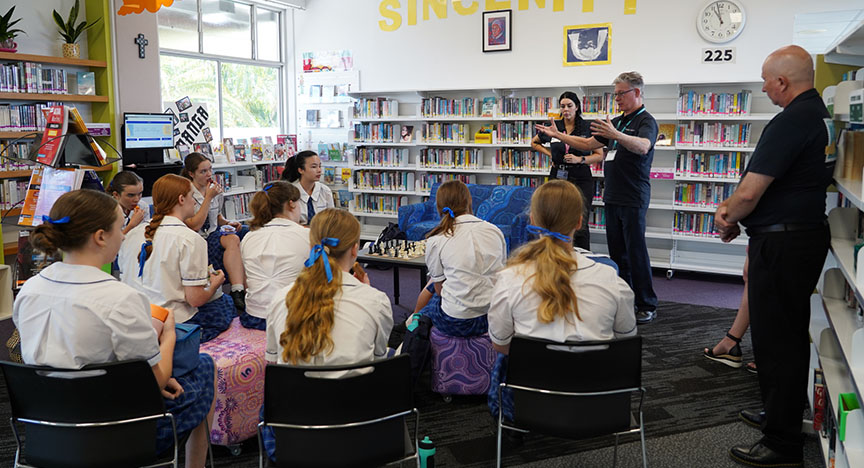
Round 14 of Zika Mozzie Seeker (ZMS) has just kicked off and more than 100 students from Loreto College Coorparoo are buzzing to take part!
The Science Ambassadors at the school including Claire, Abbie, Monica, Caitlin and Cara are keen to inspire their classmates about science and encourage their peers to get involved and contribute to the citizen science program.
Claire said ZMS is a fantastic and efficient process of data collection that will contribute to keeping dangerous mosquito species out of Southeast Queensland.
“From a citizen perspective, ZMS does an incredible job of encouraging community action whilst also improving the understanding of invasive mosquitoes among those who participate,” Claire said.
“I think ZMS is a really great way to involve Loreto students in science and is a fantastic way to collect data on such a grand scale,” Abbie added.
Monica and Caitlin love the fact that the ZMS project is protecting people in Brisbane from invasive mozzie species and are interested to see what data comes back from their mozzie traps.
“I am hoping to learn more about the impact of everyday normalities on our lives, such as having mozzies in our backyards,” Monica said.
“I am excited to see how many different types of mozzies are in my area and want to learn about how they can affect health and carry diseases,” Caitlin added.
Cara finds the notion of citizen science fascinating and is thrilled to include her friends and family in the project when she sets up her DIY trap.
“I think the ZMS project is really intriguing because we could change the world, or Australia at least, and knowing we can do that through a DIY mozzie trap is really cool!”
Amy Mackay, Curriculum Leader – Science and Helen Weston, Program Leader – Library and Research said citizen science is a school-wide focus at Loreto College Coorparoo and they are as excited as their students to take part in ZMS.
“It was at the Australian Citizen Science Association Conference that we came across ZMS,” they said.
“We always look for projects that can involve the whole school community, are hands-on and that allow students to easily connect with due to their real-world authenticity.
“We want the projects to have a purpose so the students can understand and see that their involvement can make a difference – this is why ZMS really stood out to us.”
Amy and Helen said ZMS and other citizen science projects promote learning beyond the classroom, include students that may not think of themselves as scientists and increases science literacy skills.
“Through our participation in ZMS, we are hoping to educate the students about the connections between science and their everyday lives and demonstrate that all citizens of any demographic can make meaningful contributions to science,” they said.
Brian Montgomery, Advanced Medical Entomologist at the Metro South Public Health Unit said it is rewarding to see we are on the right path when larger groups, like Loreto College Coorparoo, adopt our novel methods.
“The future health from mosquito diseases of people in our large cities will be influenced by people power,” Brian said.
“Climate change predicts mozzie disease risks will continue to grow and setting egg traps is a quick and easy way to empower the community to take charge of assessing their risk, by proving that Zika mozzies are not in their backyards.
“By sharing all these results, we create a network where each participant plays a part to help protect our community from exotic mosquito-borne diseases.
“The more mosquito collections that are made, the more confidence we have that cryptic outbreaks of potentially deadly diseases are not occurring. That is in all our best interests!
“It is also a good introduction to increasing awareness of public health, mosquitoes, technology and the empowerment that participation in a citizen scientist project can have.
“Hopefully it will encourage the students and others to seek out and participate in many more projects as they go through life,” he said.
If you are interested in becoming a citizen scientist yourself, you can participate in the Zika Mozzie Seeker project by registering here.